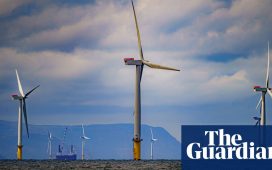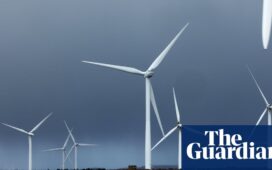Britain’s power stations are to command record prices to keep the lights on later this decade, amid concerns over a lack of electricity supply to meet a boom in demand.
Plants secured an all-time high price of £65 a kilowatt per year for 2027-28 in a “capacity market” auction to supply power, outstripping the £63 per kW a year planned for 2026-2027, National Grid’s electricity system operator said.
The annual auction sets a subsidy price to pay owners of power generators – including gas, hydroelectric, wind and solar projects – and battery storage facilities to cover the cost of meeting the nation’s electricity demand. The costs are covered through consumer bills.
In total, power plants are expected to be paid £2.7bn to ensure power demand is met in 2027-28. Longer-term, 15-year contracts for refurbishing and building new projects, including nearly 1,000 megawatts worth of new battery storage projects, were also handed out, worth £1.7bn.
The result represents the first time that energy companies have not snapped up all the capacity offered up – with 43.3 gigawatts of power secured against a target of 44 gigawatts.
The auction’s result has raised concerns that Britain could struggle to meet the increase in demand from everything from electric vehicles to heat pumps while efforts to create new power sources falter.
National Grid is attempting to speed up the time taken for new projects to connect to the grid, while major projects have been held up. The Hinkley Point C power plant project in Somerset is years late and billions over budget, while the offshore wind industry has suffered due to a supply chain squeeze.
Analysts said that two key projects, as well as a collection of smaller assets, did not secure contracts, tightening the gap between supply and demand and pushing up the price.
A proposed open-cycle gas turbine plant at the Eggborough power station site in North Yorkshire – owned by an investment vehicle controlled by the billionaire West Ham United investor Daniel Křetínský – pulled out. A separate new gas plant at Killingholme, the site of an existing station owned by Germany’s Uniper, was also initially entered into the auction before later dropping out.
“This was enough to cause the auction to clear at an all-time high price, as total capacity supply dropped beneath the demand curve,” said Fintan Devenney, a senior energy analyst at EnAppSys.
The results underscore industry concerns over whether to invest in gas assets amid a sharp fall in wholesale prices in recent months – after a spike following Russia’s full-scale invasion of Ukraine in 2022 – as well as the ability to meet booming electricity demand as Britain tries to reach net zero carbon by 2050.
Industry sources said that uncertainty over future policies on decarbonisation, and the future of new technologies such as carbon capture and storage projects and the use of hydrogen power, may have deterred some energy companies from entering the auction.
Power generators were in the spotlight as the energy crisis escalated and electricity prices – pegged to the price of gas – soared in 2022. A levy on low carbon generators’ profits was introduced.
after newsletter promotion
Gas-fired power plants have also faced scrutiny from the energy watchdog through a crackdown on energy traders “manipulating” markets. A Křetínský-owned power plant was ordered to pay £23m after Ofgem found it unfairly demanded excessive payments.
Sam Hollister, the head of energy economics and finance at the consultancy LCP Delta, said the record price was due to “the dramatic drop in the volume of new-build capacity entering the auction as unabated gas stations face uncertainty and low-carbon flexible capacity is yet to come forward in significant volumes”.
He added: “In this volatile market, if these concerns are not addressed, this may be the sign of things to come with high clearing prices and little new generation coming forward.”
Analysts at Jefferies said SSE and Germany’s RWE were “key winners” in the auction.
A separate auction is held a year before the “delivery year” to ensure the lights can be kept on. Earlier this month, this year’s auction allocated an extra £273m to ensure supply meets demand in 2025-26.











